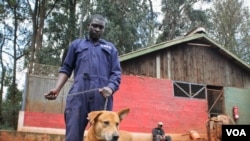Kenya is the first African country to embark on an ambitious program to eliminate rabies by vaccinating its dogs. Other African countries are watching closely to see whether a disease that kills thousands every year could actually be wiped off the continent altogether.
To many people, rabies is the stuff of nightmares, but Jean Gilchrist knows it intimately. She has been bitten by rabid dogs four times and knows exactly what to look for.
"There’s the furious type, where the dog’s running rampant and biting everybody and everything, which is very dangerous. And then there’s the dumb rabies, where the dog is basically very quiet. They start getting slowly paralyzed," said Gilchrist.
Gilchrist runs the Kenya Society for the Protection and Care of Animals (KSPCA) in Nairobi, which shelters more than 100 homeless dogs and regularly sees cases of rabies.
But that may not be the situation for long. A new initiative by the Kenyan government aims to eliminate rabies by 2030 by vaccinating 70 percent of Kenyan dogs every year for three years in a row.
A concerted effort
Austine Bitek of the Zoonotic Disease Unit, who heads the project, said rabies is finally getting the attention it deserves.
"This is a disease which has been neglected for a long time, and currently we estimate [that] between 1,000 to 2,000 human deaths occur annually in Kenya. For that reason, it has been ranked as one of the priority zoonotic diseases which have been earmarked for prevention and control," Bitek said.
Rabies is difficult to treat in humans because early symptoms are similar to flu. By the time rabies' telltale effects appear some days later – such as confusion, hallucinations and agitation – it is too late to treat. The disease is almost always fatal.
If the initiative works, Kenya will be the first African country to eradicate rabies. Bitek said neighboring countries are watching and may replicate the strategy if it succeeds.
As in most of Africa, rabies control in Kenya used to focus on simply culling dogs. Often, said Gilchrist, this involved killing every dog found on the street.
"They poison them with strychnine, which is not nice – that’s the Veterinary Department – though they’re trying to get away from that now. They have realized that this is not a good thing. It doesn't do any good and in the long run does not reduce the population," Gilchrist said.
Bitek argues dog culls are not only cruel but are ineffective in controlling rabies. Mass vaccination, on the other hand, has been successfully tried in parts of South Africa, Tanzania and the Philippines. He said it has been shown to bring rabies levels down to nearly zero.
Few dogs vaccinated now
Kenya has millions of dogs. Reaching the 70 percent vaccination rate will be difficult, especially in rural areas where dogs tend to run wild. Most dogs never get any vaccinations, according to Gilchrist.
"The vast majority have nothing. I think people are becoming more aware now, but it’s not in the tradition to spend money on a dog," said Gilchrist.
But even if they look and act like strays, Bitek said, most of the dogs do belong to somebody.
"Some of the research findings show that most of the dogs are usually owned, so it essentially means they are accessible for vaccination. It’s only that most of the owners are not able to provide for them, so they are just left to fend for themselves," said Bitek.
Kenyans are worried about rabies, he said, and he thinks most will bring their dogs to public health workers when they visit. Once enough funding is secured, he plans to send vaccination teams out to five pilot counties, eventually reaching every town, village and farm in the country.
If they succeed it would be a wonderful thing, says Gilchrist, both for Kenya’s humans and their four-legged friends.




